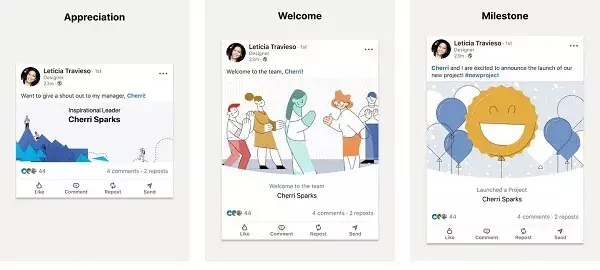In a move that has stirred both curiosity and mild discontent among its user base, LinkedIn has announced the removal of several templated posts typically used for celebrating professional milestones and achievements. These templates, characterized by their animated graphics, have been a common feature for users wanting to share their career highlights. However, recent communications from LinkedIn indicate a strategic pivot toward fostering more original content, which may ultimately enhance user engagement.
LinkedIn’s decision to retire certain post templates, including the often-utilized Appreciation, Welcome, and Skill Assessment Badge formats, reflects a broader trend in social media toward authentic self-expression. As stated in a message attributed to LinkedIn spokesperson Ahmed Ghanem, the intention is to eliminate “infrequently used templates” while encouraging users to celebrate milestones through their custom text and media. This aligns with the platform’s ongoing efforts—to create a space that values originality and personalized content over generic posts that could blur into the social media noise.
While some users may welcome this change as an opportunity for personal creativity, others who regularly utilized these templates may feel a sense of loss. The templated posts provided a quick and easy way to acknowledge accomplishments without the need for extensive input or creativity. For these users, LinkedIn’s statement may come across as condescending, suggesting they need ‘permission’ to continue sharing their journeys. This perception points to a potential disconnect between LinkedIn’s intentions and the feelings of its user base.
Furthermore, the shift appears to be driven by LinkedIn’s desire to elevate content quality. As the platform navigates an increasingly competitive social media landscape, it seeks to differentiate itself through authentic, engaging posts. This aligns well with the growing preference for video content; moving away from templates might encourage users to produce richer, more dynamic presentations of their professional achievements.
Interestingly, LinkedIn’s pivot comes at a time when generative AI is gaining traction across digital platforms. Speculation suggests that the company may be exploring ways to integrate AI technologies to help users create personalized backgrounds for announcements. Such features could replicate the stylistic appeal of previous templates while ushering in a new era of customized posts that resonate more authentically with audiences.
While current templates might feel outdated and overly simplistic, the push toward AI-generated content could enable users to generate visually appealing posts with unique designs. This approach may alleviate concerns among those who cherish aesthetic presentation while boosting the overall richness of content shared on LinkedIn.
LinkedIn’s move to remove templated posts aligns with a growing emphasis on authenticity and originality within social media. While reactions may vary, this bid to promote self-expression could ultimately benefit both users and the platform itself. By fostering a culture of individual creativity, LinkedIn positions itself as a leader in the professional networking space, opening up avenues for richer engagement and meaningful connections. As users adapt to this change, it will be fascinating to witness how their content evolves and how LinkedIn continues to innovate in response to user needs.


Leave a Reply